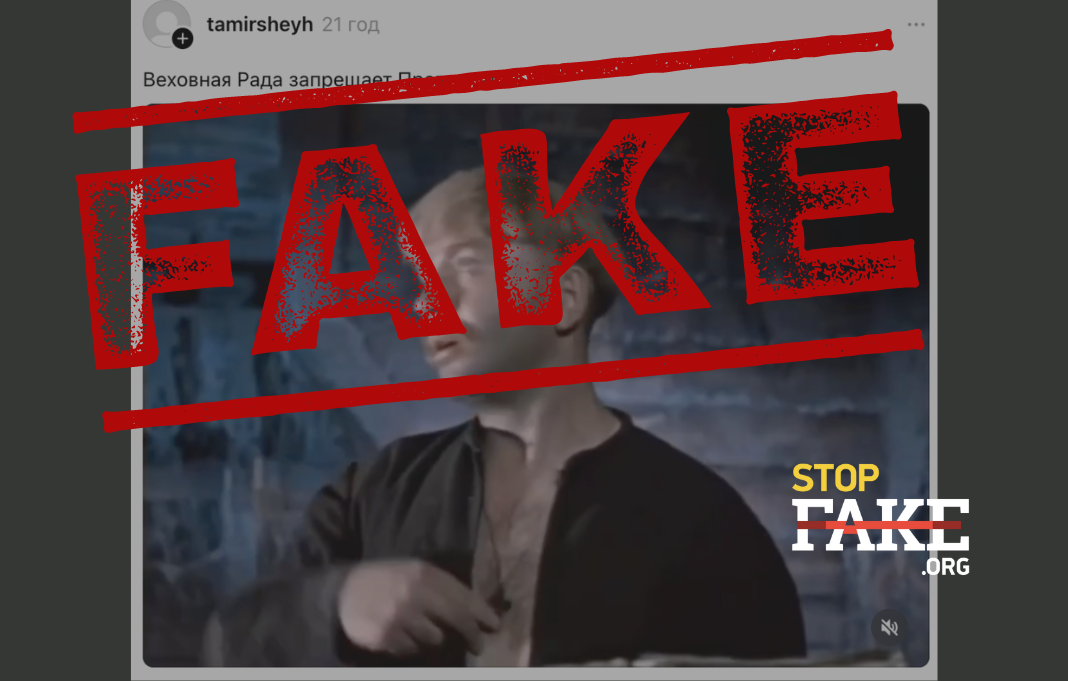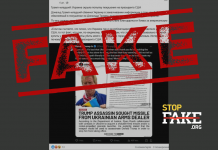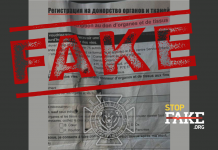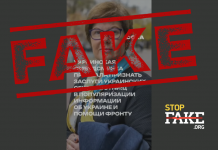There is no ban on Orthodoxy in Ukraine. The recently passed bill prohibits the activities of religious organizations affiliated with church centers whose leadership is located in the Russian Federation. According to the law, communities of the Ukrainian Orthodox Church (Moscow Patriarchate) will have nine months to sever ties with the Russian Orthodox Church.
After the Verkhovna Rada of Ukraine passed bill №8371, which regulates the activities of religious organizations with governing centers in Russia, Kremlin propaganda has been actively spreading disinformation that Orthodoxy has supposedly been «banned» in Ukraine.
«We often refer to the ideology of the Kyiv regime as ‘Ukrainian Nazism.’ This is correct, but not entirely. Ukrainian Russophobia is not just hatred of everything Russian. First and foremost, it is a satanic hatred of Orthodoxy. And attempts to destroy it at any cost, replacing it with simulacra of the Greek Catholic Union and the pseudo-Orthodox sect of the OCU,» comment the so-called Z-channels on Telegram.
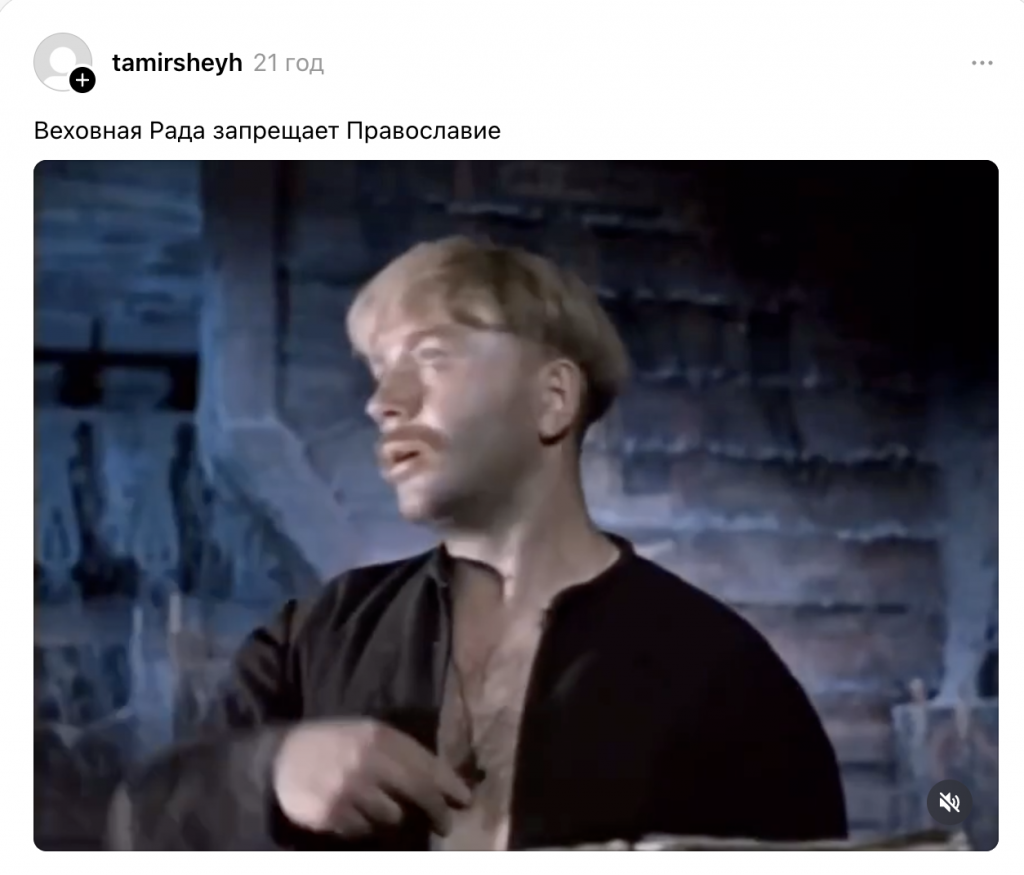
However, the purpose of the Law «On the Protection of the Constitutional Order in the Activities of Religious Organizations» (the bill to amend certain laws of Ukraine regarding the activities of religious organizations in Ukraine № 8371) is to prohibit the activities in Ukraine of only the Russian Orthodox Church and religious organizations affiliated with it.
According to the law, religious organizations suspected of cooperating with the Russian Orthodox Church (ROC) will be examined by an expert commission. This commission is to be established by the State Service of Ukraine for Ethnic Policy and Freedom of Conscience (DESS). If the commission identifies violations, DESS will issue an order to the church to rectify the situation. Additionally, the ROC cannot own or participate in legal entities registered in Ukraine.
The newly passed law also prohibits the promotion of the «Russian World» ideology, particularly banning the use of religious organizations to advance this ideology.
The law will come into force 30 days after its publication, except for one provision, according to which the communities of the Ukrainian Orthodox Church (Moscow Patriarchate) will have nine months to sever ties with the ROC.
Until May 2022, the Ukrainian Orthodox Church clearly identified itself as part of the ROC. However, following Russia’s invasion of Ukraine, the church decided at a council in Kyiv on May 27, 2022, to become independent (without declaring full autocephaly), and since then, it has denied subordination to Moscow. Currently, in the register of religious organizations and official documents, the Ukrainian Orthodox Church does not include the «Moscow Patriarchate» designation. Nevertheless, the ROC continues to consider the UOC as part of itself.
In January 2023, the State Service for Ethnic Policy and Freedom of Conscience published the findings of a religious study on the Charter of the Ukrainian Orthodox Church regarding its ecclesiastical and canonical connection with the Moscow Patriarchate. They concluded that the status described in the UOC’s Charter («independent and self-governing») does not exist as a concept in Orthodox canonical law. To denote the independence of a church, the terms «autocephalous» or «autonomous» should be used. Only an autocephalous church, which receives the corresponding document—a tomos—confirming this status, can be fully «independent in governance.» The absence of a tomos is a key indicator of the status of a subordinate religious organization.
In addition, investigations by Ukrainian law enforcement and independent journalists confirm the anti-state activities of certain members of the UOC.
The press service of the Security Service of Ukraine (SBU) told Suspilne that since the beginning of Russia’s full-scale invasion, criminal proceedings have been initiated against more than 100 UOC (MP) clergymen based on SBU materials, 50 of whom have already been notified of suspicion, and 26 have received court verdicts. In particular, in March 2024, the SBU uncovered an FSB agent network operating «under the cover» of the UOC. Members of the group were spreading Kremlin propaganda to destabilize the situation in Ukraine. The SBU reported suspicion to 14 members of the group, four of whom were detained, including one of the leaders of a UOC church in Kyiv.
In November 2022, searches were conducted in several UOC (MP) churches. In the Kyiv-Pechersk Lavra, propagandist literature was found, as well as Russian citizens hiding in the Lavra premises. In UOC churches in Rivne and Bukovyna, besides pro-Russian literature, financial means of unclear origin were discovered, and in the Ternopil diocese of the UOC (MP), Russian propaganda materials denying Ukraine’s existence were found. Similar materials, forged documents, Russian passports, and other evidence of cooperation between local workers and leadership with Russian occupiers were also found at other UOC (MP) sites in Kyiv, Kherson, Cherkasy, Zhytomyr, and Volyn regions. In the premises of the Kharkiv diocese, the SBU found, in addition to pro-Kremlin literature, Russian rations.
In April 2023, Ukrainian Pravda published the results of its investigation, which revealed that Metropolitan Onufriy of the UOC (Moscow Patriarchate) and over 20 clergymen of this church hold Russian citizenship. At that time, the UOC (MP) denied this information. However, shortly thereafter, Metropolitan Onufriy of the UOC (MP) admitted that he had held a Russian passport but claimed he had «never been interested in it» and after Russia’s invasion of Ukraine «renounced Russian citizenship.»
Numerous investigations also prove that the activities of certain UOC clergy contributed to Russia’s invasion of eastern Ukraine back in 2014, with UOC MP churches in Donbas serving as weapon depots for Russian troops, and some UOC (MP) priests maintaining close ties with terrorists from the Russian occupying forces.
Most Ukrainians also distrust the activities of the UOC on Ukrainian territory. According to a survey by the Kyiv International Institute of Sociology conducted in May 2024, 83% of Ukrainians believe that the state should intervene in the activities of the UOC in one way or another. 63% of respondents stated that this church should be completely banned in Ukraine.
As of July 2022, according to the Razumkov Center, depending on the region, 3–6% of respondents, or 4% of all Ukrainian believers, identified themselves with the UOC. A survey by Info Sapiens in January 2023 confirmed these results: 69% of Ukrainians identified as Orthodox, of which only 4% considered themselves parishioners of the UOC (MP).
Earlier, StopFake journalists debunked false information that radicals in Ukraine are burning churches that refused to transition from the MP to the UOC KP—more on this in the pieces «Fake: A Church Burned in Volyn Where the Priest Refused to Move from the MP to the UOC KP» and «Fake: Radicals Burned a UOC MP Church in Mykolaiv Region.»


